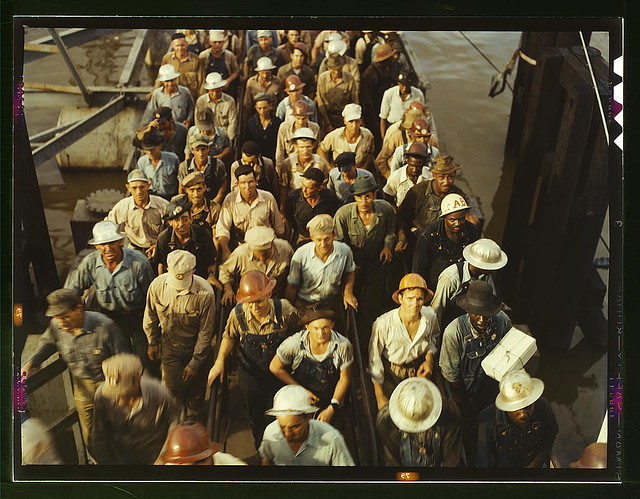by PETER FLEMING
 Workers leaving Pennsylvania shipyards, Beaumont, Texas, May 1943, by Photographer John Vachon (1914-1975) SOURCE/The Library of Congress/Flickr
Workers leaving Pennsylvania shipyards, Beaumont, Texas, May 1943, by Photographer John Vachon (1914-1975) SOURCE/The Library of Congress/Flickr
Human capital theory was invented as an ideological weapon in the Cold War. Now it is helping to Uberise the world of work
…
More importantly, Friedman’s decisive encounter with Schultz still reverberates today, and not in a good way. For example, one can trace a red thread from his 1960 victory concerning who’s exactly responsible for human capital investment, and the student debt catastrophe unfolding presently in the US, UK and many other countries that embraced neoliberalism a little too uncritically. Want a university degree and to get ahead in life but can’t afford it? Then here’s a student loan to tide you over, with terms and conditions that will hound you to the grave. The underlying message of human capital theory turns out to be simple, and Friedman cheerfully summed it up in a pithy catchphrase during the 1970s: there is no such thing as a free lunch.
Friedman had discovered in human capital theory more than just a means for boosting economic growth. The very way it conceptualised human beings was an ideological weapon too, especially when it came to counteracting the labour-centric discourse of communism, both outside and inside the US. For doesn’t human capital theory provide the ultimate conservative retort to the Marxist slogan that workers should seize the means of production? If each person is already his own means of production, then the presumed conflict at the heart of the capitalist labour process logically dissolves. Schultz too was starting to see the light, and agreed that workers might actually be de facto capitalists: ‘labourers have become capitalists not from the diffusion of the ownership of corporation stocks, as folk law would have it, but from the acquisition of knowledge and skill that have economic value.’
One can only guess what the Soviet Union made of all this. Human capital theory was literally ‘disappearing’ workers from the dominant narrative concerning what made capitalism tick. It was an ingenious ploy for spreading pro-capitalist sympathies throughout the US, particularly among the working classes who were starting to suspect that their current employer might be the real enemy. Now capitalists were speaking a different language: ‘How can you be against us? In fact, you’re one of us!’
With the elections of Margaret Thatcher and Ronald Reagan, human capital theory found hospitable political environments in the Anglo world. What followed in the UK, the US and other countries could best be described as a massive decollectivisation movement. Society no longer existed. Only individuals and their families did. Hayek in particular was a major revelation for the Iron Lady, who endlessly praised him.
Aeon for more
